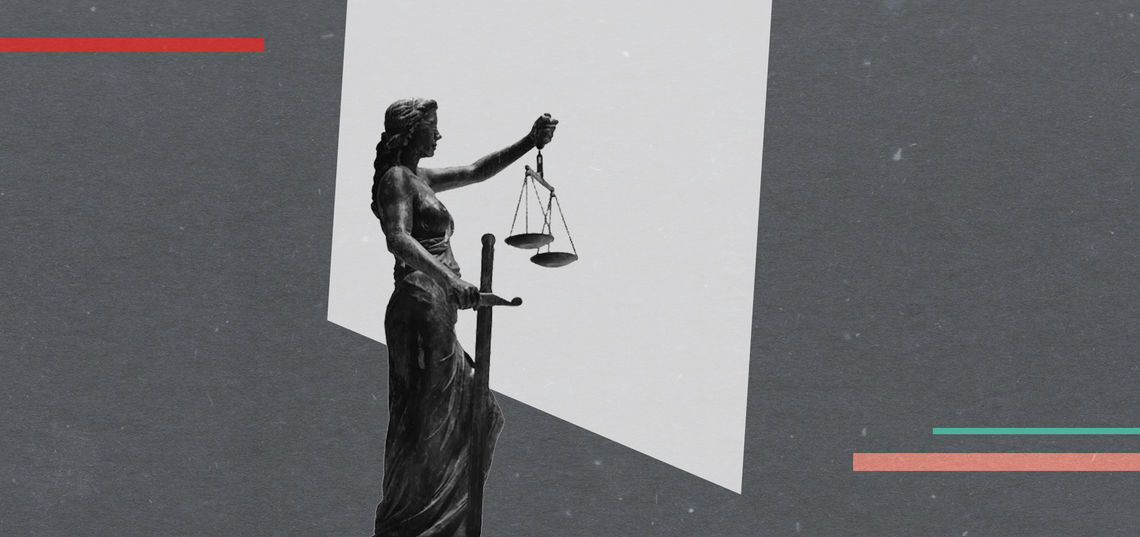
The coronavirus outbreak did not just leave its mark on Armenia’s healthcare and economic sectors. The constitutional referendum, which was scheduled to take place on April 5 and sought to dismiss seven of the nine members sitting on the Constitutional Court (CC), was also cancelled because of the COVID-19 pandemic. Considering that Armenia would not be able to hold a referendum for at least another year, the National Assembly initiated and approved a set of constitutional amendments without one.
Based on the changes that came into effect on June 26, all judges on the CC who have served 12 years or more (Alvina Gyulumyan, Felix Tokhyan and Hrant Nazaryan) retired, while those who have not yet met the 12 year tenure limit will continue to serve on the Court. The powers of the Chair of the Court, Hrayr Tovmasyan, were also terminated but he continues to serve as a judge on the Court, not yet having reached the 12-year limit. The constitutional amendments were mostly in compliance with the recommendations proposed by the Venice Commission, which the Justice Ministry requested in July, 2019. According to procedural law, the oldest judge of the CC, Ashot Khachtatryan, temporarily took up the responsibilities as Chair until a new one is elected by the judges of the court, after the vacancies are filled. Since the adoption of the constitutional changes, the reform process of the high court has continued and it is important to look back at some of key developments that have unfolded during the past two months to better understand the processes that are still ahead of us.
Three Vacancies Instead of Seven
The National Assembly completed the dismissal of the three members of the CC, after it passed a bill on June 30, which stipulates that the three judges of the high court whose powers were terminated by the constitutional changes will be eligible for a state pension. With the proposed amendments, the legal procedure for the appointment of the new CC judges also changed and it is based on this new procedure that three new candidates were nominated. The Government (i.e. the executive branch, which includes the Prime Minister and Minister of Justice), then the President and then the General Assembly of Judges take turns nominating a candidate to the CC. According to the previous order, candidates were first nominated by the President, then the General Assembly of Judges and then the Government. If the previous order was maintained, then it would have violated the requirement set by Article 166.1 of the Constitution, which says that the Government, President and the General Assembly of Judges should each nominate three judges to the high court. After the 2015 Constitution entered into force, the General Assembly of Judges and the President have each nominated one candidate, Arman Dilanyan and Vahe Grigoryan respectively. Once a candidate is nominated, they need to be confirmed by the National Assembly with a three-fifths (60%) supermajority.
After the bill was passed by Parliament, President Armen Sarkissian declined to sign it into law. According to the procedure, the President has 21 days to sign laws adopted by the National Assembly or apply to the CC if there are concerns about the constitutionality of a particular law. But if the President declines to sign a bill into law, then the Speaker of the Parliament has the power to sign it within five days. Ararat Mirzoyan, however, waited until the 21 day period had fully elapsed and only on July 22 signed the bill on making changes and amendments to the Law on the Constitutional Court. According to amendments made to NA Rules of Procedure, constitutional changes do not need to be signed into law by the President. This was done to provide consistency with precedent, as constitutional changes in 1995, 2005 and 2015, which were approved through a referendum, were not signed by the President.
Four Members of the CC Apply to the ECHR
After the constitutional changes entered into force, Hrayr Tovmasyan and the three members that were dismissed from their posts applied to the European Court of Human Rights (ECHR) to challenge the legality of their removal. They asked the Court to apply an interim measure and suspend the enforcement of the constitutional amendments, until the Court delivers its final verdict. According to the complaint, “the adoption of constitutional amendments was carried out in violation of the national law and was arbitrary.” They also claimed that the constitutional amendments were the result of a long process of harassment of judges of the CC, which started after the 2018 change in government and escalated after the CC accepted former President Robert Kocharyan’s application concerning the constitutionality of criminal charges brought against him.
The European Court, however, refused to apply an interim measure as requested by the four applicants. Vahe Griogryan, one of the CC judges, said that the ECHR applies interim measures only in a limited number of areas, some of which concern cases of expulsion and extradition. He went on to say that some of the less common precedents are concerned with the right to a fair trial and the right to respect for private and family life.
According to the press release issued by the Court, the request was rejected since it was “outside the scope of application of Rule 39 (interim measures) of the Rules of Court and did not involve a risk of serious and irreparable harm of a core right under the European Convention on Human Rights.” The statement also said that the Court grants such requests only on an exceptional basis, “when the applicants would otherwise face a real risk of irreversible harm.” According to Grigoryan, it is not a novelty that members of high courts seek justice at the ECHR following their dismissal but there had been no previous cases where members of a high court applied to the European Court after their powers were terminated by constitutional amendments because they had completed their term of office. Judge Grigoryan noted that the applicants’ motives of requesting an international tribunal to suspend the constitutional amendments still remain a mystery to him. “We are not speaking of ordinary individual applicants who were unable to seek justice in their country and sought it in the ECHR,” he said. “This is a request originated by the three former members and one current justice of the high court of the state, whose oath was to ‘ensure the supremacy of the Constitution.’” Grigoryan believes that they have resorted to “an extremely dangerous means,” which implies that the process of constitutional amendments can be suspended for the sake of preserving their offices as members and Chair of the CC.
Who Are the New Constitutional Court Nominees?
On July 23, the Government nominated the candidacy of Vahram Avetisyan for one of the three vacant posts of the CC judge. Avetisyan, 42, is a doctor and professor of law and has practiced law in both the public and private sectors. Since 2002, he has been teaching at Yerevan State University (YSU), where he has served as Chair of the Civil Law Department since 2013. Avetisyan worked at the Prosecutor General’s Office as senior investigator and later as senior prosecutor. From 2014 to 2015, he worked at the Council of Europe as an expert and in 2014 was a lecturer at the Justice Academy. Avetisyan was also a member of the working group formed by the Justice Minister in 2014 to make amendmendments to Armenia’s Civil Code.
Following Avetisyan’s nomination, over 50 human rights activists, lawyers, people persecuted after the March 1, 2008 post-election unrest, and descendants of March 1 victims killed during the clashes between the police and protestors appealed to the Government to withdraw Avetisyan's nomination. In a letter addressed to the National Assembly and the Government, they claim that the CC reforms should be aimed at appointing independent judges to the country’s highest court and Avetisyan does not meet this criteria. The letter says that following the March 2008 unrest, hundreds of protesters, activists and leaders of the popular movement were wrongfully prosecuted and imprisoned, which were ultimately confirmed by the Criminal Chamber of the Court of Cassation, chaired by Vahram Avetisyan's father, Davit Avetisyan. Some of those wrongful convictions have already been subject to review by courts, including by the CC and those against Avetisyan's candidacy believe that his father will be among those to be held accountable. They believe that there is an apparent conflict of interest and that Vahram Avetisyan cannot be directly or indirectly involved in the investigation of those cases.
Three weeks after his nomination, on August 17, Avetisyan issued a statement saying that he notified the Speaker of Parliament about his decision to withdraw his candidacy for the CC judge position. Avetisyan explained that, after a meeting and discussions with MPs from the My Step faction, he came to realize that their approaches and views regarding the role of the CC and independence of justices are not in line with his vision and in certain cases are even unacceptable for him. He believes that, under such circumstances, it seems unrealistic that he will secure 80 votes in the National Assembly and that his further participation in the process is not expedient.
On August 1, the General Assembly of Judges nominated the candidacy of Yervand Khundkaryan, the current Chair of the Court of Cassation, for the post of CC judge. Khundkaryan, 48, has served as a judge at the Appellate Court and at the Court of Cassation. In 2010, he was appointed the Chair of the Civil-Administrative Chamber of the Court of Cassation. In September 2018, Khundkaryan was elected the Chair of the Court of Cassation by the National Assembly for a six-year term. He was a member and later the president of the governing board of the Justice Academy. Khundkaryan is a recipient of the Mkhitar Gosh medal, which is awarded for outstanding state and social-political activities, as well as for significant services in the spheres of diplomacy, law and political science. He is also a recipient of the title of Honorary Lawyer of the Republic of Armenia for his contribution to strengthening the rule of law.
Khundkaryan’s nomination was also criticized by lawyers and human rights activists, who claim that an official who worked under the previous regime and for years turned a blind eye to some of their grave violations cannot be appointed to the CC of the “new Armenia.” Back in May 2019, when speaking about judicial reforms, PM Nikol Pashinyan said that all those judges, who according to decisions of the ECHR, have committed gross human rights violations should resign or be removed from their posts. At least thirteen of the cases handled by Khundkaryan were challenged at the ECHR and in all thirteen cases the Court’s decisions were against Armenia. As a result, the Armenian Government has been obligated to pay almost 312,000 euros as compensation to the applicants of those cases.
On August 4, President Armen Sarkissian nominated Artur Vagharshyan, who is a law professor at YSU. This is Vagharshyan’s second nomination by the President, after the Parliament voted against his candidacy for the same position on May 29, 2019 (30 in favor and 53 against). This is also President Sarkissian’s sixth nomination since April 9, 2018, when he assumed his duties. The National Assembly did not confirm three of the previous candidates and one refused to be re-considered for the post of CC judge, after being rejected the first time. From among the President’s nominations, prominent lawyer Vahe Grigoryan was the only one to be elected to the post of CC judge on June 18, 2019.
Vagharshyan, 56, has been working at YSU since 1993 and is currently chairing the department of Theory and History of State and Law. He received his law degree from YSU and throughout his career participated in a number of training programs in Germany, Budapest, Moscow, the United States, the United Kingdom and the Netherlands. Vagharshyan told Azatutyun that it is quite likely that the Parliament will again refuse to confirm his candidacy. Vagharshyan also stressed that he has never been affiliated with any political party and believes that he has the qualifications to be appointed as a CC judge.
During his recent meeting with the members of the Expert Commission on Constitutional Changes, President Armen Sarkissian raised concerns regarding the procedure for the election of CC judges. Speaking about the importance of checks and balances in the country and that the Constitution should allow each of the branches of power to fully execute its obligations, Sarkissian implied that the President’s opinion does not play a decisive role in the appointment of the CC judges. He explained that, despite the nomination of potential candidates, it is ultimately the National Assembly that confirms their nomination. One possible solution that Sarkissian offered was to have a system where three of the judges of the CC are appointed by the President, another three by the Supreme Judicial Council and three by the National Assembly.
It remains to be seen if the Parliament will confirm the candidacies of the two remaining nominees and when the CC will be able to resume its normal course of operations.
****
On August 19, the opposition Bright Armenia faction along with the lawmakers from the Prosperous Armenia Party faction applied to the CC to challenge the constitutionality and legality of the amendments to the Constitution. Although the Court can hold hearings with only six judges, Hrayr Tovmasyan and Arevik Petrosyan have not attended sessions since June 30 and the Court has not held hearings due to lack of quorum.
also read
Resolving the Constitutional Court’s Crisis of Legitimacy
By Nerses Kopalyan , Lusine Sargsyan
During an extraordinary session, Armenia’s National Assembly initiated and unanimously approved a set of Constitutional amendments to address the crisis of political and institutional legitimacy of the Constitutional Court.
Understanding Armenia’s Constitutional Court
By Lusine Sargsyan
Lusine Sargsyan explains the history of the institution that is the subject of an upcoming referendum on April 5, 2020.
What Happened to the Constitutional Referendum?
By Ejmin Shahbazian , Maritsa Mandalyan
The COVID-19 pandemic upended the government’s plans to hold a Constitutional Referendum that sought to dismiss seven of the nine current judges of the Constitutional Court. Here’s what happened.
by the same author
Primer: Post-Revolution Criminal Cases
By Lusine Sargsyan
A comprehensive list of the most high-profile investigations launched against former officials and their associates following the 2018 Velvet Revolution.
ECHR Chamber Judgment Holds Azerbaijan Accountable, But Falls Short
By Maria Titizian , Lusine Sargsyan
In a Chamber judgment, the ECHR has found Azerbaijan in violation of two articles of the European Convention on Human Rights in the gruesome 2004 murder of Lieutenant Gurgen Margaryan.
Observations About Armenia’s COVID-19 Response
By Lusine Sargsyan
While it is still early to assess the effectiveness of the Armenian government’s COVID-19 response, Lusine Sargsyan reviews some of the key measures authorities introduced over the past five months.


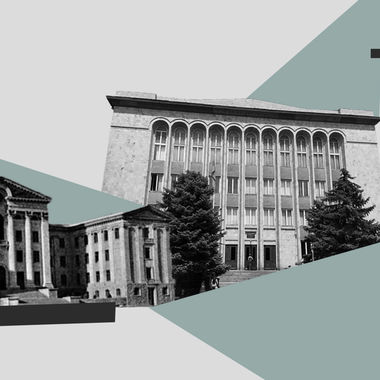
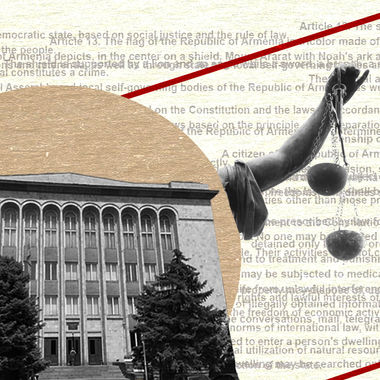
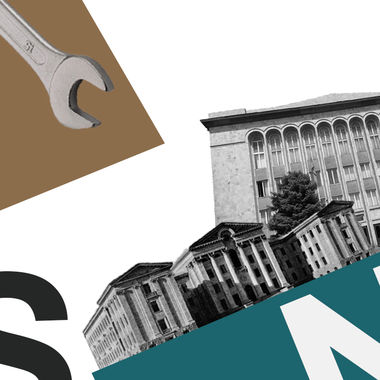
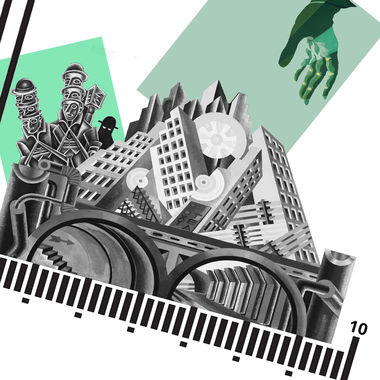
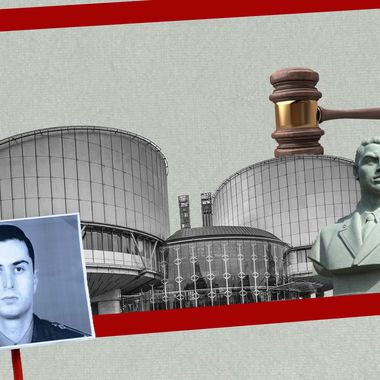



EVN Report welcomes comments that contribute to a healthy discussion and spur an informed debate. All comments will be moderated, thereby any post that includes hate speech, profanity or personal attacks will not be published.